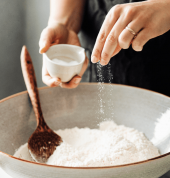Lack of access to health care and healthy foods has caused our communities to suffer from high blood pressure and heart disease. With the right tools and resources, we can help bridge the gap, together.
High blood pressure, also known as hypertension, happens when the force of your blood pushing against your artery walls is consistently too high.
Think of it like this: if your blood vessels are hoses, high pressure over time wears them down—leading to heart attacks, strokes, kidney disease, and more.
Blood pressure is measured in two numbers:
A normal reading is less than 120/80. Anything above that could signal trouble.
Especially in the morning or at the back of the head
Blurred or double vision
Feeling lightheaded, tired, or faint
Because it’s silent, routine screening is critical—especially if you’re over 35 or have a family history.
Living with asthma? Our community member, Eriel, knows a thing or two about managing flare-ups or asthma attacks.

Here are a few factors that might put you at risk for high blood pressure:

The good news? High blood pressure is manageable—with knowledge, support, and lifestyle changes.


Common types of blood pressure medications include:


The good news? High blood pressure is manageable—with knowledge, support, and lifestyle changes.


Common types of blood pressure medications include:



Common types of blood pressure medications include:


We read the online discourse on high blood pressure and found that our community is looking for:

High blood pressure is one of the most prevalent chronic conditions in the Black community—but it’s also one of the most misunderstood. Many people don’t realize they have it until it causes serious health problems.
Many individuals with high blood pressure have a family history of the condition, even if they lead healthy lifestyles. This genetic risk is particularly important for younger adults, who are seeing a rise in early-onset hypertension.
Black people often face significant delays in diagnosis—even during hypertensive emergencies. Whether in the ER or at a routine visit, symptoms like dizziness, chest pain, or extremely high readings may be dismissed or minimized by providers.
Even after a diagnosis, treatment equity is a major gap. Many Black people report being prescribed medications that cause unpleasant side effects—like fatigue, brain fog, and dizziness—without alternatives being offered. These symptoms are often dismissed as “normal” or “not that bad,” discouraging people from staying on treatment.
High blood pressure is one of the most prevalent chronic conditions in the Black community—but it’s also one of the most misunderstood. Many people don’t realize they have it until it causes serious health problems.
Many individuals with high blood pressure have a family history of the condition, even if they lead healthy lifestyles. This genetic risk is particularly important for younger adults, who are seeing a rise in early-onset hypertension.
Black people often face significant delays in diagnosis—even during hypertensive emergencies. Whether in the ER or at a routine visit, symptoms like dizziness, chest pain, or extremely high readings may be dismissed or minimized by providers.
Even after a diagnosis, treatment equity is a major gap. Many Black people report being prescribed medications that cause unpleasant side effects—like fatigue, brain fog, and dizziness—without alternatives being offered. These symptoms are often dismissed as “normal” or “not that bad,” discouraging people from staying on treatment.
While there’s no cure yet, treatment can help many people with Parkinson’s Disease live active, fulfilling lives. Explore the resources below.
Listen to how our members lowered their pressure—and raised their quality of life.
Explore flavorful, low-sodium meals you’ll actually want to cook.
Learn about treating high blood pressure with Dr. Nesbitt.
While there’s no cure yet, treatment can help many people with Parkinson’s Disease live active, fulfilling lives. Explore the resources below.
Listen to how our members lowered their pressure—and raised their quality of life.
Explore flavorful, low-sodium meals you’ll actually want to cook.
Learn about treating high blood pressure with Dr. Nesbitt.
Over 100K community members across the US are making a difference in their health. Are you ready to take action?
Already part of the community? Login here.
